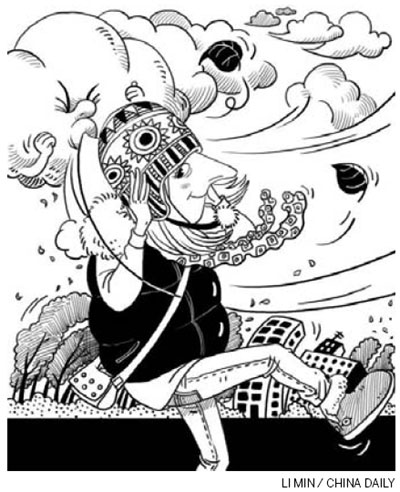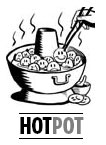All wound up over a strong gust of wind
By Debbie Mason ( China Daily ) Updated: 2010-11-18 09:54:23
Recently in Beijing it's been quite windy, feeling more like spring in some ways. The winds have brought beautiful clear, blue skies and the kind of puffy clouds you might see on a daily basis in my home country, England.
Unless it is too ferocious (I remember a particularly bad windstorm that closed bus routes and businesses throughout London, leaving commuters stranded), the wind isn't really worth mentioning - it's considered bracing and fresh when out in the wilds, and a little annoying in towns if one's hat gets blown off.
The unimportance we attach to it is why I have always noticed that in China it seems people are almost paranoid about a few gusts.
When overhearing locals complaining about the weather (they do it just as much as we Brits are renowned for), if it's not leng (cold), it's windy (gua feng).
When my little boy was just a baby, I would always get earnest warnings from complete strangers if his stomach navel was bared, for that was where the wind could enter his body and give him diarrhea, they suggested.
I was also told not to push him outside in his stroller on a windy day in case he swallowed some wind and went a bit crazy.
I soon discovered that the character for crazy (feng ), or mad, has the character for wind () in it, beneath the illness radical.
And to mock someone has the speech radical next to the character for wind (). Speaking wind?
What is so evil about the wind, I wondered?
Some light is shed when you look at some of the theories behind TCM, or Traditional Chinese Medicine, which I for one would never ignore.

It has been tried and tested for so many years I have to believe that some of it works, and so many people today still swear by it that they can't all be wrong.
"The pernicious influence of wind is considered the major cause of illness in traditional Chinese patterns of disharmony," says the howstuffworks website.
"It combines readily with other pathogens, giving rise to syndromes known as wind cold, wind heat, and wind dampness.
"This pathogenic factor appearing without warning and constantly changing ... (is) considered a yang form of evil qi, and often attacks the upper body, head, throat and eyes."
The website describes symptoms such as twitching, spasms, shaking and lung disease, all caused by the movement wind provokes.
I wonder how much was provoked by airborne diseases like tuberculosis, now brought mainly under control, but certainly a killer in China as recently as the 1990s.
Or maybe the spring winds in Beijing, which carry on them deserts of sand.
As far as I know, there is no such wind fear in Western thinking. We might be wary of drafts while we sleep, as not only are they uncomfortable, they are also thought to give rise to stiff joints. But drafts are not "wind", as such.
Western idioms revolving around wind are usually positive unless they specifically state the opposite, for example "it's an ill wind that blows no good".
But most have positive inferences - like "the winds of change", which usually indicate a change for the better, and "blowing the cobwebs away", where a good gust of wind is believed to be capable of freshening up something (or someone) that has gathered dust.
When someone "throws caution to the wind", they take a risk, rather recklessly but also rather bravely. Risk in Chinese, feng xian, is also about wind, but here this is not a positive meaning.
And in feng shui, I have found out that the wind bit is the qi that's scattered - water is needed to bring it all together again.
I haven't quite solved the mystery despite trawling through a few websites. The people I have asked have backed up my suspicions, but no one has given any real basis to why Brother Wind is so feared.
So for now I'll button up my coat, squash my hat down more firmly on my head, and head out to the hills for some air.
The fact that it's not too cold yet has put some wind in my sails.
|
|
|
|
|
|
|
|


























 Raymond Zhou:
Raymond Zhou: Pauline D Loh:
Pauline D Loh: Hot Pot
Hot Pot Eco China
Eco China China Dream
China Dream China Face
China Face






